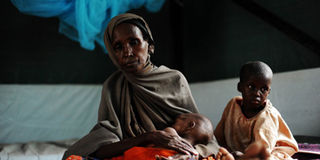Delicate balance for Kenya in refugee crisis

Sixty-year-old Suban Osman sits with two of her malnourished grand children at a clinic run by Doctors Without Borders (MSF) at the Dadaab refugee camp. Photo/AFP
What you need to know:
- A section of MPs are determined to push for the closure of Dadaab and Kakuma camps despite criticism from refugees themselves and warnings from human rights groups.
- The Defence and National Security committee will make a formal recommendation on the matter in the next three weeks when it is expected to table a report in Parliament.
- A sub-committee of the team will likely visit the two camps.
MPs demanding repatriation of Somali refugees have sparked a debate on how to balance national security and the country’s allegiance to international humanitarian law that protects refugees.
A section of MPs are determined to push for the closure of Dadaab and Kakuma camps despite criticism from refugees themselves and warnings from human rights groups.
The MPs not only want to force the government to conduct an audit of the refugee status in the country but also to give it reason enough to move refugees to safe areas in southern Somalia.
The matter features prominently in an ongoing investigation by joint parliamentary committees probing the September 21 terrorist attack on Nairobi’s Westgate mall.
The Defence and National Security committee will make a formal recommendation on the matter in the next three weeks when it is expected to table a report in Parliament. A sub-committee of the team will likely visit the two camps.
Security committee chairman Asman Kamama has boldly come out to declare the camps the country’s biggest security threats.
Speaking after the Westgate attack, he said the camps were hosting dangerous elements that end up harming Kenyans.
The Tiaty MP described Dadaab camp as a nursery for terrorists. “The UN must understand the security of Kenyans comes first. Even if it is about human rights, it should not be at our expense,” the member was quoted saying.
Another member of the Defence committee wants the government to present to Parliament a comprehensive report on the status of refugees in the country.
Saboti’s David Wafula wants the government to give actual statistics of refugees in the country and refugee camps hosting them.
“Kenyans need to know and have a right to know how many refugees are in their country and their exact location.
It is assumed that all refugees come from Somalia, and so we need a breakdown showing their countries of origin as well,” he told Sunday Nation.
'CITIZENSHIP THROUGH CORRUPT MEANS'
The member, who has asked for a statement in Parliament on the matter said its alarming because government doesn’t seem to know what goes on in the camps.
“Who vets them and who monitors their movement?” the member said, arguing that many end up leaving the camps and even acquire Kenyan citizenship through corrupt means.
The MPs’ demands may have been reinforced by intelligence reports that indicated some camps harbour militants and serve as storage centres for arms.
There are concerns that al-Shabaab militants enter the country through refugee camps.
Mr Wafula said reports that some camps were being used as training grounds for terrorists are cause enough for the government to investigate what goes on inside them.
It is not the first time the issue of repatriation is coming up. In fact, it was one of the campaign promises made by Jubilee.
A statement to Parliament in June on the audit of the Jubilee Government’s 100 days in office, Majority Leader Aden Duale said the government had prioritised repatriation of refugees through the establishment of a joint coordination commission.
He said a tripartite commission consisting the UN Nations High Commissioner for Refugees and the governments of Kenya and Somalia had been formed to coordinate the repatriation programme.
Former President Kibaki last year told a conference in London that the Dadaab refugee camp, which houses nearly half a million people, was overcrowded and posed security threats not only to Kenya but to the entire region.
But Geneva-based Human Rights Watch has cautioned Kenya against the move, noting that the country is bound by international law and has an obligation to host the refugees unless they are willing to leave.
The group said while the security of Kenyans is priority, forcing refugees back to a country that is still experiencing violence would breach Kenya’s obligations under international law.
Suggestions from government officials have included asking the international community-led by the UN to identify a section of the safe areas of Somalia that were freed from Al-Shabab in an operation carried out by the Kenyan Defence Forces and the African Mission in Somalia.
The border regions are believed to be pacified areas.
NO REASON NOT TO GO BACK HOME
Those supporting the proposal say there is no longer any reason why Somalia refugees, especially, should not go back home now.
The challenge is in the international law which states clearly that repatriation must be voluntary. Already the refugees have come out to protest against the demands for relocation.
Human rights groups have joined the latest debate cautioning against the push on humanitarian grounds. The groups have instead advised the government to vet the refugees, warning that repatriation of refugees could fuel more instability in Somalia.
Former Security Minister Katoo Ole Metito said in Parliament that the issue of Kenya bound by international law.
Kenya is a signatory to the 1951 Convention relating to the Status of Refugees which forbids the involuntary return of refugees to a country where the threat of persecution persists.
After the Kenya Defence Forces routed al-Shabaab militants in Somalia, calls arose to repatriate the refugees to safer areas in southern Somalia.
Some MPs say that security of Kenyans should come first.





